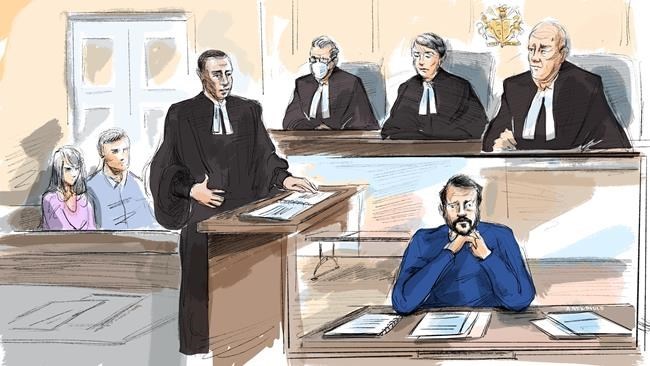TORONTO — Ontario’s highest court dismissed multiple murderer Dellen Millard’s conviction appeal for his father’s killing Friday, while applying a recent Supreme Court decision entitling him to seek parole after 25 years, not 75.
The Ontario Court of Appeal affirmed Millard’s life sentence for the first-degree murder of Wayne Millard. But it ruled the order to stack the 25-year parole ineligibility period on top of his previous two murder sentences could not stand.
Millard, who was self-represented and appeared by video from prison, did not appear to react as the court returned its decision just minutes after he wrapped up his appeal arguments Friday.
Justice Eileen Gillese, speaking on behalf of the three-judge panel, said the trial judge's reasons were compelling for convicting Millard for his father's 2012 murder.
"This court sees no errors in the reasons of the trial judge," said Gillese. "Your conviction appeal is dismissed."
The decision caps a week where Millard and co-convicted Mark Smich also appealed their convictions for murdering Tim Bosma and Laura Babcock. The court has reserved its decision on those appeals.
Millard asked the court Friday before it adjourned to clarify the exact date he could apply for parole, but the court declined to comment since it's still deciding the other appeals.
Millard was sentenced in 2018 for his father's murder with no chance of parole for 75 years after the trial judge stacked the 25-year period of parole ineligibility with his previous sentences for the Bosma and Babcock murders.
Then the Supreme Court ruled last year those types of consecutive periods of parole ineligibility are unconstitutional, entitling Millard to apply for parole after 25 years.
The ruling said consecutive parole ineligibility periods shook the foundation of criminal law and were incompatible with human dignity. But the decision was criticized by victims' families who felt it denied individual justice to each person killed by a multiple murderer.
"These judges believe that it is cruel and unusual punishment to give a person a sentence that leaves them no hope for the future. We have no hope," said Linda Babcock, Laura Babcock's mother, in a statement.
"Our family and friends have suffered the loss of our dear daughter Laura for over a decade. The grief and heartache are no less now than when she was cruelly taken from us."
Wayne Millard's death in November 2012 was originally ruled a suicide, but police reopened an investigation after his son was charged with Bosma's murder almost six months later.
Millard purchased the gun that killed his father, was at the house the night of the murder, and had set up a false alibi to conceal what he had done, the judge found.
A jury in June 2016 first found Millard and Smich guilty of murdering Bosma, a 32-year-old man whose body was burned in an incinerator after he took the two men out for a test drive of his pickup truck in May 2013.
The Crown argued the same incinerator was used to get rid of the body of 23-year-old Laura Babcock, theorizing Millard was motivated to kill his one-time lover to settle a love triangle with his then-current girlfriend.
In the hearings this week, Millard described Bosma's murder as "careless and sloppy," while portraying himself as someone who would have taken much greater care to conceal evidence, had he been the culprit.
On Friday, he asked the court why he would continue to use a phone that put him at his father's house the night of the murder, but then later stop using a second phone he left at a friend's house to purportedly mislead police as part of a false alibi.
Meanwhile, Smich's lawyers argued the evidence against him was intermingled with evidence against Millard at the Babcock and Bosma murder trials. The lawyers argued the trial judge did not properly instruct the jury on how to weigh and separate the evidence, leading to an unfair trial.
In response, the Crown said the judge offered clear and detailed instructions to the jury that ensured a fair trial for both Millard and Smich, with no reversible errors.
- With files from Liam Casey.
This report by The Canadian Press was first published March 17, 2023.
Jordan Omstead, The Canadian Press

